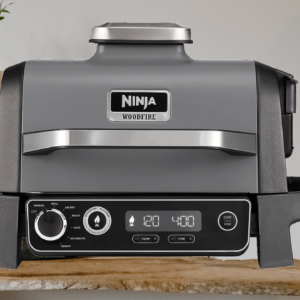Al fresco dining is increasingly becoming a coveted luxury in modern homes. The ability to enjoy food amidst nature adds a new dimension to the culinary experience, and the design of the outdoor kitchen plays a pivotal role in this.
Cladding is one of the key elements that stand out in elevating the aesthetics and functionality of such spaces. Cladding not only enhances the appearance of the outdoor kitchen but also provides durability and resistance against the elements.
This article delves into the transformative power of cladding in outdoor kitchen design and how it artfully combines aesthetics with utility.
JUMP TO:
The Beauty Of Cladding

Cladding refers to covering one material with another, usually for decorative or protective purposes. In outdoor kitchen design, cladding is often used to cover surfaces such as walls, countertops, and cooking appliances. It adds a layer of texture and colour that can elevate the overall aesthetic appeal of the space.
Using natural materials such as stone, brick, and wood in cladding can lend a rustic charm to the outdoor kitchen and seamlessly integrate with the surrounding environment. On the other hand, sleek and modern finishes like metal or composite panels can give a contemporary touch to the design.
Cladding Throughout History
Cladding is not new and has been used by civilizations throughout history. In ancient times, the Egyptians used mud bricks to clad their homes for protection against the harsh desert climate. The Greeks and Romans were known for using marble cladding extensively in their architecture to showcase opulence and luxury.
Cladding Transforming Outdoor Kitchens
In today’s world, cladding has evolved from a functional element to a design feature that can transform outdoor kitchens into stunning spaces. With advancements in technology, a wide variety of materials are available for cladding that can withstand extreme weather conditions and require minimal maintenance.
Moreover, cladding also offers the versatility to mix and match different materials to create unique designs and patterns. For example, wood cladding on the walls and stone cladding on the countertops can bring a sense of warmth and contrast to the outdoor kitchen design.
Protection Against The Elements
Outdoor kitchens are constantly exposed to harsh weather conditions such as rain, wind, and sunlight. Cladding materials are chosen not only for their visual appeal but also for their ability to withstand these elements.

For instance, natural stone cladding provides excellent water resistance and can withstand extreme temperatures without cracking or fading. Similarly, metal cladding is highly durable and corrosion-resistant, making it a popular choice for outdoor kitchen design.
Improving Functionality
Cladding also plays a crucial role in enhancing the functionality of outdoor kitchens. For instance, stone or brick cladding can help create a heat-resistant surface around the cooking area, preventing any damage from hot pots and pans.
Cladding can also create storage units and shelving, maximizing space efficiency in small outdoor kitchen designs. Click here to learn more about this.
Design Freedom
The versatility of cladding allows for endless design possibilities. With a wide range of materials, colours, and textures available, designers and homeowners can create unique and personalized outdoor kitchen spaces that reflect their style.
Cladding can also add depth and dimension to the design by incorporating patterns or combining multiple materials.

Benefits Of Outdoor Kitchen Design With Cladding
In summary, the use of cladding in outdoor kitchen design offers a multitude of benefits:
- Enhanced aesthetics
- Protection against the elements
- Improved functionality
- Design freedom and versatility.
Cladding truly plays an integral role in transforming outdoor kitchens into multi-functional, visually appealing spaces, allowing a unique dining experience amidst nature.
Whether it’s a cosy backyard cookout or a grand barbecue party, al fresco dining is even more enjoyable with the right cladding.
How To Achieve The Best Results
To achieve the best results, it’s important to carefully choose the cladding materials that will best suit your outdoor kitchen design and needs. Factors such as durability, maintenance, and budget should also be considered.
It’s recommended to consult a professional designer or contractor who can guide you in selecting the right cladding materials and installation methods for your specific outdoor kitchen project.
Other Ways To Improve Your Outdoor Kitchen

Aside from cladding, other design elements can enhance your outdoor kitchen’s overall look and functionality. These include:
- Lighting: Proper lighting can create a warm and inviting atmosphere in your outdoor kitchen. Consider adding accent lights or string lights for a cosy ambience.
- Landscaping: Incorporating plants and greenery around your outdoor kitchen can add a touch of natural beauty and create a seamless connection with the surrounding environment.
- Seating: Adding comfortable seating options such as benches, bar stools, or lounge chairs can make your outdoor kitchen a welcoming space for cooking and dining.
The Importance Of Working With Professionals
Designing an outdoor kitchen can be a complex and challenging process. Working with professionals with the expertise and experience to create a functional, safe, and visually appealing space is essential.
Professional designers or contractors can also help you choose the right cladding materials to complement your overall design. They can also ensure proper installation for long-lasting results.
Other Things To Consider
Before embarking on an outdoor kitchen project, it’s essential to consider local building codes and regulations. These may dictate certain restrictions or requirements for outdoor structures, including kitchens.
Additionally, proper maintenance is crucial in preserving the beauty and functionality of your outdoor kitchen. Regular cleaning and upkeep of cladding materials can help prevent damage or deterioration over time.






